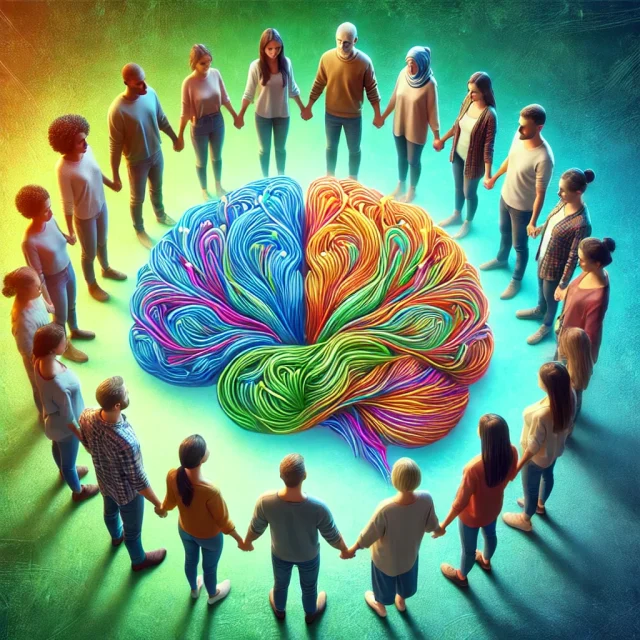Mental health awareness has gained significant momentum over the past few years as society becomes increasingly attuned to the importance of mental well-being. The conversation around mental health is no longer relegated to the margins but has taken center stage in discussions about overall health, productivity, and quality of life. The goal of mental health awareness is to educate the public, reduce stigma, and encourage those who are struggling to seek help. Understanding the complexity of mental health, the challenges faced by individuals, and the impact of awareness efforts is crucial to fostering a society where mental health is prioritized as much as physical health.
The Importance of Mental Health Awareness
Mental health affects every aspect of a person’s life, from emotional well-being to physical health and social interactions. Mental health disorders, such as depression, anxiety, bipolar disorder, and schizophrenia, are widespread and can be debilitating. According to the World Health Organization (WHO), approximately one in four people will be affected by mental or neurological disorders at some point in their lives. Despite the prevalence of mental health issues, stigma and misinformation often prevent individuals from seeking the help they need.
Awareness campaigns aim to break down these barriers by normalizing conversations about mental health. They help people recognize the signs of mental health problems, understand that it is okay to ask for help, and that seeking treatment is a sign of strength, not weakness. Awareness efforts also educate the public about the various forms of mental illness, the impact these conditions can have on individuals and families, and the resources available for those in need.
Your Mind Matters: Speak Up, Seek Help.
The Stigma Surrounding Mental Health
One of the biggest challenges in mental health awareness is overcoming the stigma that surrounds mental illness. Stigma can take many forms, including discrimination, fear, and misunderstanding. It can be perpetuated by societal attitudes, cultural beliefs, and even the language used to discuss mental health. For example, people with mental illness are often labeled as “crazy” or “unstable,” which can lead to social isolation, discrimination in the workplace, and reluctance to seek treatment.
Stigma not only affects those with mental health disorders but also their families and loved ones. It can create a sense of shame and guilt, leading to further isolation and exacerbating the condition. Addressing stigma is therefore a critical component of mental health awareness efforts. By changing the narrative around mental health, we can create a more supportive and inclusive environment where individuals feel comfortable seeking help without fear of judgment.
The Role of Education in Mental Health Awareness
Education is a powerful tool in the fight against mental health stigma. Schools, workplaces, and community organizations can play a key role in spreading awareness and providing education about mental health. For example, incorporating mental health education into school curriculums can help young people understand the importance of mental well-being and recognize the signs of mental health issues in themselves and others. Workplaces can offer training on mental health awareness and provide resources for employees who may be struggling.
Public health campaigns are another important avenue for education. These campaigns often use mass media, social media, and public events to reach a broad audience and disseminate information about mental health. They can highlight personal stories of those who have experienced mental illness, share facts about mental health, and provide information on where to seek help. The goal is to make mental health a part of everyday conversations and encourage people to take proactive steps to care for their mental well-being.
Mental Health: A Priority, Not a Privilege.
The Impact of Mental Health Awareness Campaigns
Mental health awareness campaigns have made a significant impact in recent years, helping to shift societal attitudes and reduce stigma. For example, campaigns like “Time to Change” in the UK and “R U OK?” in Australia have sparked national conversations about mental health and encouraged people to support one another. Social media has also played a crucial role in spreading awareness, with hashtags like #MentalHealthAwareness and #EndTheStigma allowing people to share their experiences and support others.
These campaigns have not only raised awareness but have also led to tangible changes in policy and practice. For instance, increased awareness has prompted governments to invest more in mental health services, improve access to care, and implement policies that support mental health in schools and workplaces. In some countries, mental health has been integrated into primary healthcare, making it easier for people to access treatment.
Moreover, mental health awareness campaigns have empowered individuals to take charge of their mental well-being. Many people have reported that these campaigns have helped them recognize the signs of mental health issues in themselves or others and encouraged them to seek help. This shift in attitude is crucial, as early intervention can significantly improve outcomes for those with mental health disorders.
The Role of Technology in Mental Health Awareness
Technology has revolutionized the way we approach mental health awareness and care. Online platforms, apps, and social media have made information about mental health more accessible than ever before. Teletherapy, for instance, has become a popular option for those seeking mental health support, particularly in the wake of the COVID-19 pandemic. This has made it easier for people to access therapy from the comfort of their homes, breaking down barriers such as geographical location or mobility issues.
Mental health apps and online communities provide support and resources to those who may not have access to traditional forms of care. These platforms can offer everything from mindfulness exercises to peer support networks, helping individuals manage their mental health on a day-to-day basis. Social media has also been a powerful tool for raising awareness, with influencers and mental health advocates using their platforms to share personal stories and promote positive mental health practices.
However, the role of technology in mental health is not without challenges. While online platforms can be a source of support, they can also contribute to mental health issues, particularly among young people. The constant pressure to present a perfect image on social media, cyberbullying, and the spread of misinformation can all negatively impact mental well-being. It is important, therefore, to approach the use of technology in mental health with caution and ensure that it is used in a way that supports, rather than harms, mental health.
The Intersection of Mental Health and Other Social Issues
Mental health does not exist in a vacuum; it is influenced by a range of social, economic, and environmental factors. Issues such as poverty, unemployment, discrimination, and social isolation can all contribute to mental health problems. For example, people living in poverty are more likely to experience mental health issues due to the stress and uncertainty associated with financial instability. Similarly, marginalized groups, such as LGBTQ+ individuals, people of color, and refugees, often face higher rates of mental health disorders due to the discrimination and social exclusion they experience.
Addressing these social determinants of mental health is crucial to improving mental well-being. Mental health awareness efforts must therefore be intersectional, taking into account the various factors that can impact mental health. This means advocating for policies that address these underlying issues, such as affordable housing, access to healthcare, and anti-discrimination laws. It also means providing targeted support for those who are most vulnerable to mental health problems, such as low-income individuals, minority groups, and those experiencing social isolation.
The Role of Mental Health Professionals in Awareness
Mental health professionals play a crucial role in raising awareness and providing care. Psychologists, psychiatrists, counselors, and social workers are on the front lines of mental health care, providing diagnosis, treatment, and support to those in need. They also play a key role in educating the public about mental health, whether through public speaking, writing, or participating in awareness campaigns.
Mental health professionals are often involved in research that helps to improve our understanding of mental health disorders and the best ways to treat them. This research is essential for developing evidence-based interventions and ensuring that mental health care is effective and accessible. By sharing their expertise, mental health professionals can help to dispel myths about mental illness and provide accurate information to the public.
However, the mental health field is facing significant challenges, including a shortage of mental health professionals and limited access to care in many areas. Addressing these challenges is critical to improving mental health outcomes and ensuring that everyone has access to the support they need.
Listen, Understand, Support: Mental Health Matters.
The Future of Mental Health Awareness
The future of mental health awareness is promising, with increasing recognition of the importance of mental health and a growing movement to prioritize mental well-being. However, there is still much work to be done. Stigma remains a significant barrier to care, and many people still lack access to the mental health services they need.
To build on the progress that has been made, it is essential to continue raising awareness and advocating for mental health at all levels of society. This includes pushing for policy changes that support mental health, such as increased funding for mental health services, improved access to care, and the integration of mental health into primary healthcare. It also means continuing to challenge stigma and create a culture where mental health is seen as just as important as physical health.
Conclusion
Mental health awareness is a crucial aspect of overall health and well-being. By educating the public, reducing stigma, and promoting mental health as a priority, we can create a society where everyone has the opportunity to thrive. While significant progress has been made in recent years, there is still much work to be done. By continuing to raise awareness and advocate for mental health, we can build a future where mental health is understood, supported, and valued by all.






